In the vast expanse of our oceans, marine vessels navigate through challenging environments, enduring varying temperatures, corrosive saltwater, and the need for efficient cooling systems. Whether it’s a cargo ship transporting goods across continents or a cruise liner offering luxury voyages, the sustainability of marine operations is a pressing concern. Among the many components crucial to vessel performance, titanium heat exchangers stand out as a cornerstone of sustainable marine engineering.
Understanding Titanium Heat Exchangers
Before diving into their sustainability benefits, it’s essential to understand what titanium heat exchangers are and how they function. Heat exchangers are devices designed to transfer heat between two or more fluids, ensuring efficient cooling or heating processes. In the marine context, heat exchangers play a pivotal role in regulating temperatures within engines, generators, HVAC systems, and other critical machinery onboard vessels.
Titanium heat exchangers are distinguished by their construction material – titanium, a metal renowned for its exceptional properties. Titanium exhibits high strength, corrosion resistance, and lightweight characteristics, making it an ideal choice for marine applications. These heat exchangers typically consist of titanium tubes or plates arranged in a manner that facilitates the transfer of heat between fluids without direct contact.
Sustainability Advantages of Titanium Heat Exchangers
1. Corrosion Resistance
One of the most significant sustainability advantages of titanium heat exchangers lies in their corrosion resistance. Unlike traditional heat exchangers made from materials like copper or aluminum, titanium can withstand the corrosive effects of seawater over extended periods. This resistance minimizes the need for frequent maintenance, reducing downtime and operational disruptions for marine vessels. By extending the lifespan of heat exchangers, titanium contributes to overall sustainability by decreasing material consumption and waste generation.
2. Enhanced Energy Efficiency
Efficiency is paramount in sustainable marine operations, and titanium heat exchangers excel in optimizing energy usage. Due to their superior thermal conductivity, titanium heat exchangers facilitate efficient heat transfer processes, enabling engines and other machinery to operate at optimal temperatures. This enhanced energy efficiency translates to reduced fuel consumption and lower emissions, aligning with environmental sustainability goals in the maritime industry.
3. Lightweight Design
The lightweight nature of titanium offers additional sustainability benefits for marine vessels. Compared to alternative materials, such as stainless steel or copper-nickel alloys, titanium has a higher strength-to-weight ratio, allowing for the construction of lighter heat exchangers without compromising structural integrity. Reduced weight contributes to fuel savings and decreased carbon footprint during vessel operation, making titanium heat exchangers an eco-friendly choice for maritime applications.
4. Longevity and Reliability
Investing in durable equipment is fundamental to sustainable practices, and titanium heat exchangers deliver in terms of longevity and reliability. With proper maintenance, titanium heat exchangers can endure harsh marine environments for decades, outlasting conventional alternatives and reducing the frequency of replacements. This longevity not only minimizes resource consumption but also mitigates the environmental impact associated with manufacturing and disposal processes.
5. Resistance to Fouling
Fouling, the accumulation of marine organisms and debris on heat exchanger surfaces, poses challenges for vessel performance and sustainability. Titanium’s inherent resistance to fouling mitigates this issue, as its smooth surface discourages the attachment of organisms and facilitates easy cleaning. By reducing the need for chemical treatments or mechanical cleaning methods, titanium heat exchangers promote eco-friendly maintenance practices and preserve marine ecosystems.
Case Studies: Applications in Sustainable Marine Operations
1. Cruise Ships
Cruise ships represent a prominent sector where sustainability initiatives are gaining traction. By incorporating titanium heat exchangers into their HVAC systems, propulsion engines, and onboard amenities, cruise liners can achieve significant reductions in energy consumption and greenhouse gas emissions. Enhanced corrosion resistance and longevity ensure that these heat exchangers contribute to the long-term sustainability of cruise operations, aligning with industry trends towards eco-conscious cruising.
2. Cargo Vessels
Efficiency is paramount in cargo shipping, where fuel costs and environmental regulations drive the adoption of sustainable technologies. Titanium heat exchangers play a vital role in optimizing engine performance and cooling systems aboard cargo vessels, leading to fuel savings and emissions reductions. By investing in durable and energy-efficient equipment, cargo shipping companies enhance their operational sustainability while meeting evolving environmental standards.
In the quest for sustainable marine operations, titanium heat exchangers emerge as indispensable assets, offering a myriad of environmental and economic benefits. Their corrosion resistance, energy efficiency, lightweight design, longevity, and resistance to fouling make them catalysts for positive change in the maritime industry. As vessels strive to minimize their ecological footprint and adapt to evolving regulations, the adoption of titanium heat exchangers represents a proactive step towards a greener and more sustainable future on the seas. By leveraging the transformative potential of titanium technology, marine operators can navigate towards a horizon where sustainability and profitability converge.
